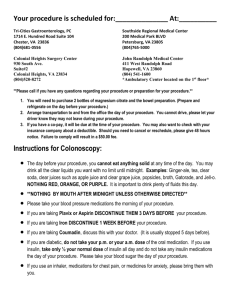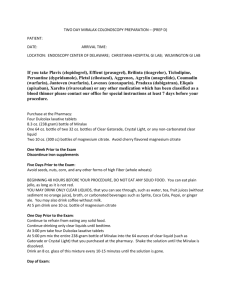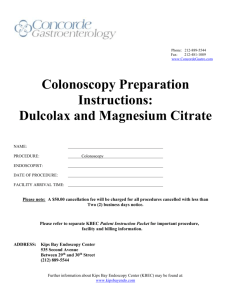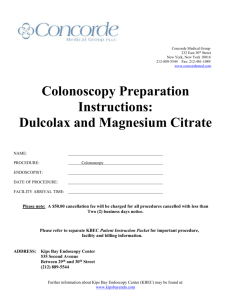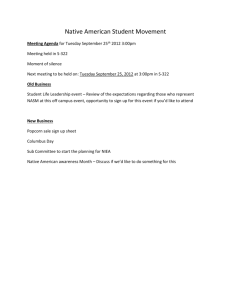Your procedure is scheduled for: At:______ Tri
advertisement
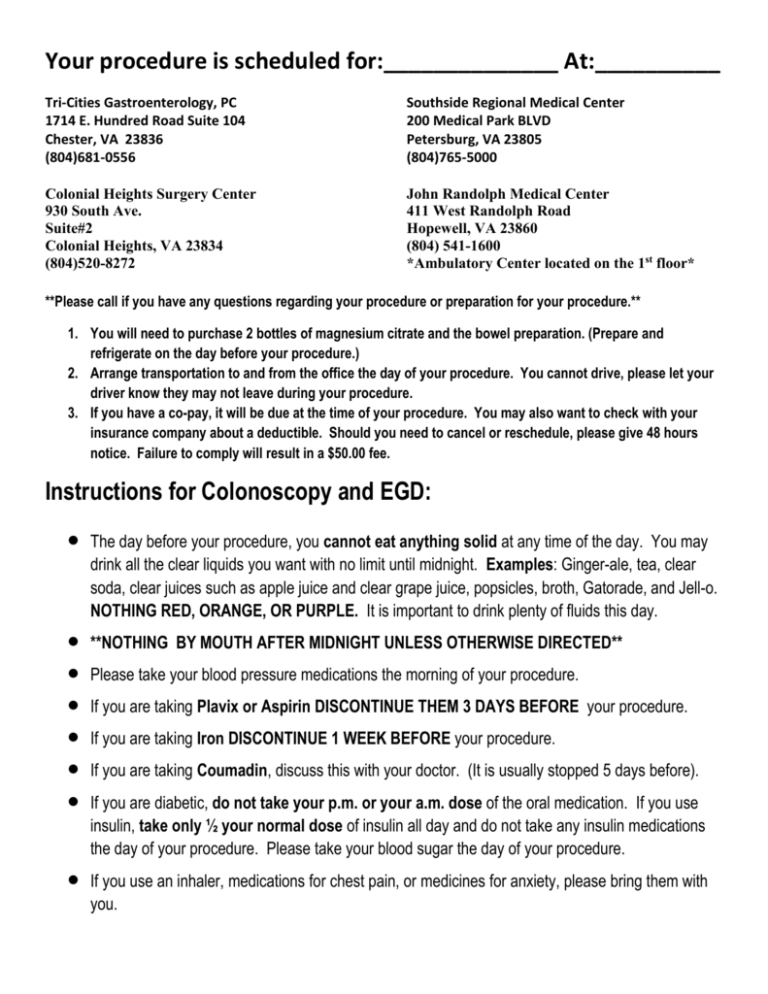
Your procedure is scheduled for:______________ At:__________ Tri-Cities Gastroenterology, PC 1714 E. Hundred Road Suite 104 Chester, VA 23836 (804)681-0556 Southside Regional Medical Center 200 Medical Park BLVD Petersburg, VA 23805 (804)765-5000 Colonial Heights Surgery Center 930 South Ave. Suite#2 Colonial Heights, VA 23834 (804)520-8272 John Randolph Medical Center 411 West Randolph Road Hopewell, VA 23860 (804) 541-1600 *Ambulatory Center located on the 1st floor* **Please call if you have any questions regarding your procedure or preparation for your procedure.** 1. You will need to purchase 2 bottles of magnesium citrate and the bowel preparation. (Prepare and refrigerate on the day before your procedure.) 2. Arrange transportation to and from the office the day of your procedure. You cannot drive, please let your driver know they may not leave during your procedure. 3. If you have a co-pay, it will be due at the time of your procedure. You may also want to check with your insurance company about a deductible. Should you need to cancel or reschedule, please give 48 hours notice. Failure to comply will result in a $50.00 fee. Instructions for Colonoscopy and EGD: The day before your procedure, you cannot eat anything solid at any time of the day. You may drink all the clear liquids you want with no limit until midnight. Examples: Ginger-ale, tea, clear soda, clear juices such as apple juice and clear grape juice, popsicles, broth, Gatorade, and Jell-o. NOTHING RED, ORANGE, OR PURPLE. It is important to drink plenty of fluids this day. **NOTHING BY MOUTH AFTER MIDNIGHT UNLESS OTHERWISE DIRECTED** If you use an inhaler, medications for chest pain, or medicines for anxiety, please bring them with you. Please take your blood pressure medications the morning of your procedure. If you are taking Plavix or Aspirin DISCONTINUE THEM 3 DAYS BEFORE your procedure. If you are taking Iron DISCONTINUE 1 WEEK BEFORE your procedure. If you are taking Coumadin, discuss this with your doctor. (It is usually stopped 5 days before). If you are diabetic, do not take your p.m. or your a.m. dose of the oral medication. If you use insulin, take only ½ your normal dose of insulin all day and do not take any insulin medications the day of your procedure. Please take your blood sugar the day of your procedure. If you are drinking MoviPrep follow these instructions: 2:00pm: Drink 1st bottle of magnesium citrate. 4:00pm: Drink 2nd bottle of magnesium citrate. 6:00pm: Mix and drink 1st A&B packets. 8:00pm: Mix and drink 2nd A&B packets. If you are drinking Go-Lytely or Nu-Lytelty follow these instructions: 3:00pm: Drink 1st bottle of magnesium citrate. 6:00pm: Begin drinking your bowel prep. Drink 8oz. every 15 minutes until completed within 4 hours. 8:00pm: Drink 2nd bottle of magnesium citrate. If you are drinking Miralax follow these instructions: 4:00pm: 1st bottle of magnesium citrate. 5:00pm: 510g of Miralax or Glycolax (this is over the counter) mixed with 94128oz. of any clear liquid that isn’t red, orange, or purple. Drink this over a 3 hour period. 8:00pm: 2nd bottle of magnesium citrate. If you are taking Half-Lytely follow these instructions: 2:00pm: Take the 2 laxative pills that come with the prescription 3:00pm: Begin to drink the Half-Lytely bowel prep; drink 8oz. every 10-15 minutes until completed. You should be finished in approximately 2 hours. If you have discomfort, try to mix the Half-Lytely with some ginger-ale. 6:00pm: Drink 1st bottle of magnesium citrate. 8:30pm: Drink 2nd bottle of magnesium citrate. If you are taking Prepopik follow these instructions: 2:00pm: Mix the 1st packet and fill up to the 5oz. line of the enclosed cup and drink. Follow that with five 8oz glasses of clear liquids nothing red, orange, or purple. 7:00pm: Mix the 2nd packet and fill up to the 5oz. line and drink. Follow this with three 8oz. glasses of clear liquids nothing red, orange, or purple. **NOTHING BY MOUTH AFTER MIDNIGHT UNLESS OTHERWISE INSTRUCTED** CLEAR LIQUID DIET FOOD GROUP Milk & Beverages FOODS ALLOWED FOOD TO AVOID Tea (decaffeinated or regular), carbonated beverages, fruit flavored drinks Milk, Milk Drinks Meats & Meat Substitutes NONE ALL Vegetables Fruits & Fruit Juices NONE ALL Strained fruit juices: apple, white grape, lemonade Fruit juices with unstrained fruit NONE ALL All Others All Others (No Red, Orange, or Purple liquids) Grains & Starches Soups Desserts Clear Broth, Consomme Clear flavored gelatin, popsicles (No red, orange, or purple gelatin or popsicles) Fats Miscellaneous NONE Sugar, honey, syrup, clear hard candy, salt ALL All Others Frequently Asked Questions: What is a Colonoscopy? A colonoscopy is the visual examination of the lining of the large intestine (colon) and rectum. The purpose is to identify any abnormalities by inserting a flexible-fiber optic tube into the anus. The tube, which is about the thickness of your finger, is slowly passed into the rectum and colon. The results obtained from the colonoscopy are useful in diagnosing and treating a variety of symptoms and diseases. How do I prepare for the exam? The colon must be thoroughly clean in order for the exam to be accurate and complete. Usually this consists of drinking a large volume of a solution that flushes the colon clean. Your physician will provide you with the information about cleansing instructions. What happens during a Colonoscopy? A needle will be placed in your arm vein, through which medication will be injected to help you feel relaxed and sleepy. While you are laying on your left side, the flexible colonoscope will be inserted and the tube will be moved through the colon. If there is an abnormal growth (polyp), it will be removed by applying electrical heat (electrocautery) through the colonoscope. A small tissue specimen (biopsy) may be taken from the lining of the colon for microscopic analysis. Neither test will cause you any discomfort. What can I expect after the exam? Due to the medication, you may feel drowsy for a period of time. You will not be allowed to drive or use any type of heavy machinery until the following morning. Your doctor will discuss the finding of your exam and provide you with any instructions to follow when you return home. Ask your doctor or nurse if you have any questions. What are the risks of the procedure? Generally a colonoscopy is a safe procedure; however, there is a risk of anesthesia, pain, bleeding, and perforation (making of a hole). Complications may require hospitalization and surgery. What is an endoscopy? Esophagogastroduodenoscopy is a procedure that allows your doctor to examine the lining of the esophagus (food pipe), stomach, and duodenum (first part of the small intestine). Using a thin, flexible tube with its own lens and light source, the doctor can view the upper intestinal tract in order to identify any abnormalities. How do I prepare for the exam? It is important not to eat or drink anything for at least 8 hours before the exam. Be sure to discuss with your doctor whether you should use any of your usual medications before the procedure and whether you have any drug allergies. What happens during the endoscopy? Upper GI Endoscopy is usually performed on an outpatient basis. All dentures and eyeglasses must be removed. A needle for intravenous (IV) medication will be placed in a vein in your arm prior to the procedure. Medication will be injected through this needle that will make you relaxed and sleepy. As you lie on your side, the doctor will insert a small mouthpiece. What can I expect after the exam? Due to the medication, you will probably feel drowsy for a period of time. You will not be allowed to drive and automobile or use potentially dangerous machinery until the next day. Your doctor will discuss the findings of the exam and provide you with instructions to follow when you return home. Ask the doctor or nurse if you have any questions. What is the risk of the procedure? Generally an endoscopy is a safe procedure; however there is a risk of anesthesia, pain, bleeding, and perforation (making of a hole). Complications may require hospitalization and surgery. **Please note that we use third party anesthesia companies, there is a possibility that you may be responsible for any additional fees that your insurance may not cover. **
